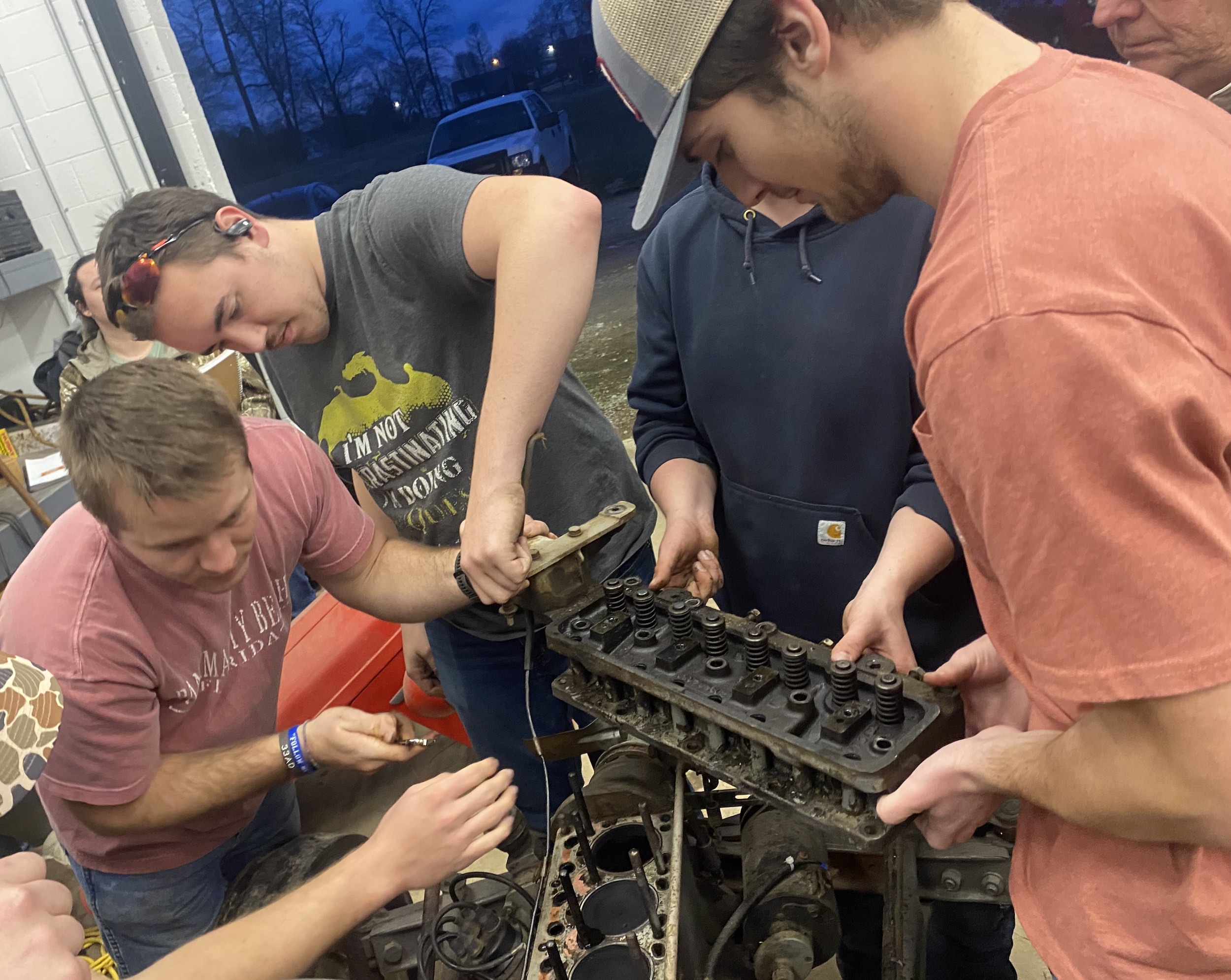Tennessee Tech students revive rural machinery for local farmers in tractor repair class

Working on a tractor engine are, from left, Casey Hollis, Alex Woodard, Joe Markland
and Jacob Rambo.
This past semester, students at Tennessee Tech University got the chance to assist
local farmers while getting hands-on experience during the Agricultural Machinery
and Tractors class offered by Tech’s School of Agriculture.
Led by Abdul Momin, assistant professor of agriculture engineering technology, students
attended lectures on the interior workings of common farm equipment and then went
on to apply this knowledge to diagnose and fix real machinery. These broken tractors
came from farmers in the region who, in return, received their repaired machines back
for no labor cost to them.
“The students have to figure out why the tractor is not running,” Momin explained.
“Then, once they find a defective or damaged part, we replace those, and the students
reassemble it.”
The students heard lectures on topics ranging from how to calculate how well a tractor
is running to how to get the most use out of a tractor, as well as lessons on safety
and getting to know the shop where they would be doing their hands-on work.
Evan Plunkett, an agricultural engineering technology student from Lincoln County,
Tenn., who took the class this past spring, grew up on a cattle farm and regularly
operated tractors, but had not gotten the chance to learn the mechanics of how they
worked. He took a previous class at Tech with James Baier, assistant professor of
agriculture, which helped him learn the inner workings of smaller tractors, but the
class this past semester showed him how to apply those skills to larger machinery.
“We started tearing down this tractor that hadn't been running,” Plunkett said. “We
started from the outside in, and we finally got it completely split in half. I wasn't
afraid to get dirty, so I usually got stuck with the nasty jobs, lying on my back
up under the tractor and covered in grease,” he added with a chuckle.
Momin has established a relationship with the Middle Tennessee Antique Engine and
Tractor Association (Middle TN AETA), whose members visited to speak to the students
themselves and offer their expertise on the farm equipment the students were studying.
“We have an interest in antique tractors, all of us – that’s why this group exists,”
said Middle TN AETA member Dave Qualls. “We are happy to be able to pass our knowledge
on to the students. We're very willing to show them what we know.”
Members of Middle TN AETA explained that understanding the inner workings of farm
equipment is vital, especially for small- and medium-sized farms that use older equipment
along with a few pieces of more modern technology. Modern tractors are largely computerized,
making it difficult for farmers to diagnose problems and repair their equipment themselves.
“Some of these huge master farms with the state-of-the-art equipment have their own
mechanics on staff, certified by the manufacturers,” said Middle TN AETA member Jack
Duncan. “But then you have that middle tier of farmers who are making do with a lot
of older equipment mixed with some new equipment who could not stay in business and
compete if they couldn't do some of their own repairs.”
In addition to working with the local group of tractor experts, the students also
got to visit TriGreen Equipment, a John Deere dealership in Cookeville.
Being able to collaborate with local farm machinery experts has enabled the students
to gain valuable skills for their future careers, while also allowing them to give
back to local farmers whose equipment they fixed at no cost to the farms.
“Anyone in the agriculture industry is going to have to deal with a tractor somewhere,”
said Plunkett, who plans to follow a career path in precision farming – the technique
of using technology to pinpoint exactly what a plot of land needs to produce at its
best. “Farm machinery and tractors are really the backbone of modern agriculture.”
Momin hopes future tractor repair classes will bring more opportunities for community
partnerships and hands-on learning experiences for students pursuing careers in agriculture,
where knowing how farming equipment works will give them an edge over their competition
for jobs in the field.
"It is a win-win relationship for both sides,” Momin said. “The farmers get work done
on their equipment and the students learn with hands-on work.”

